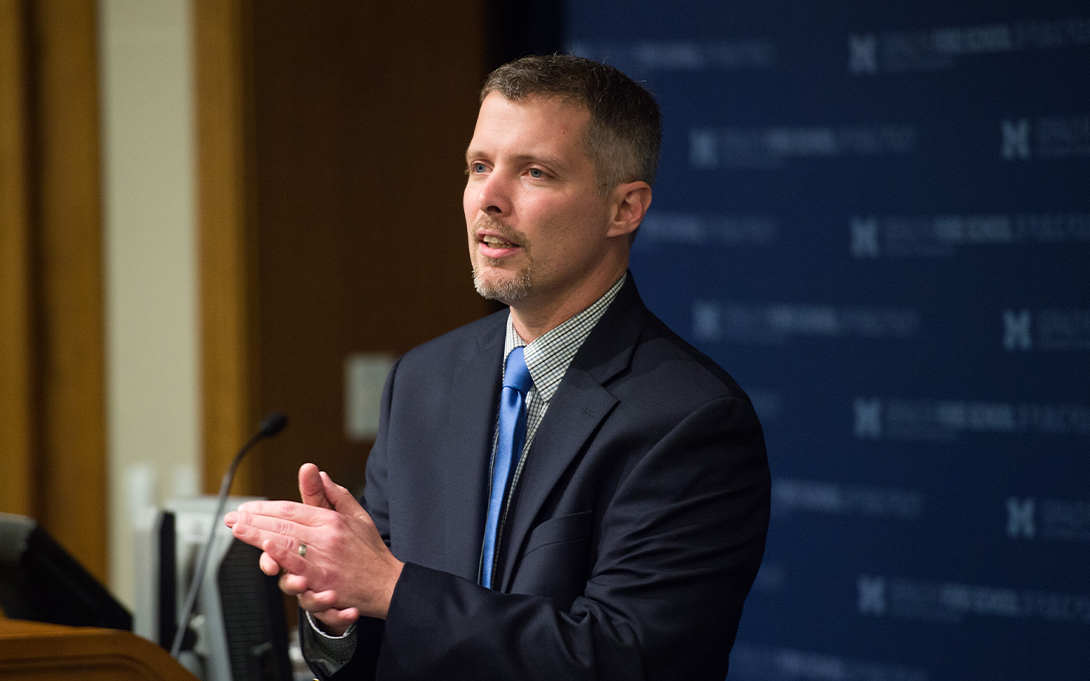
H. Luke Shaefer, director of Poverty Solutions at the University of Michigan and professor of social work and public policy, has been named special counselor to the director of the Michigan Department of Health and Human Services (MDHHS).
For the next two years, within his position as director of Poverty Solutions, Shaefer will work with the department’s human services policy leadership teams on a set of anti-poverty and economic mobility initiatives to enhance public benefit programs and identify pathways for sustainable employment for those with major barriers to work.
Shaefer will work with state partners to provide research evidence, data and analysis, and policy recommendations for MDHHS leadership to consider. The special counselor designation will allow him to spend a portion of his time advising and facilitating discussions on high-level human services and anti-poverty policy.
This work builds on efforts to advise MDHHS on a set of poverty-related program and policy recommendations Poverty Solutions undertook over the summer as well as current efforts to provide data support.
At the department’s request, Shaefer and faculty from across U-M departments examined a set of actionable program and policy recommendations focused on strengthening work supports and reducing the negative impacts of “benefit cliffs” that reduce the positive rewards to employment for families by abruptly cutting access to public benefits.
Poverty Solutions also convened several focus groups to help inform the recommendations in partnership with Community Action Agencies and other regional organizations across the state, including Wayne County, Clare County, and Marquette County in Michigan’s Upper Peninsula.
Since July, Amanda Nothaft, data and evaluation manager at Poverty Solutions, has provided data analysis for DHHS that the department would not otherwise have had the capacity to complete.
Nothaft’s work evaluating asset limit policies was critical to M-DHHS’s change in policy of this that will become effective December 1st. This change will simplify and streamline access to critical benefits by raising and standardizes asset limits across a variety of benefit programs, and no longer requiring applicants to gather extensive documentation of their assets that has been proven to reduce access.
H. Luke Shaefer is the director of Poverty Solutions, a University of Michigan-wide center housed at the Ford School. He is a professor of social work and public policy whose research on poverty and social welfare policy in the United States has been published in top peer-reviewed academic journals such as the Journal of Policy Analysis and Management and the American Journal of Public Health. His research is supported by the National Science Foundation, the Abdul Latif Jameel Poverty Action Lab, the Bill & Melinda Gates Foundation, and others. Shaefer has presented his research at the White House and before numerous federal agencies, has testified before the U.S. Senate Finance Committee, and has consulted with a number of the nation's largest social service providers as well as numerous community-based agencies. His work has been cited in the New York Times, the Washington Post, The Atlantic, Vox, the LA Times, and many others. His recent book with Kathryn Edin, $2.00 a Day: Living on Almost Nothing in America, was named one of the 100 Notable Books of 2015 by the New York Times Book Review, and won the Hillman Prize for Book Journalism, among other awards.